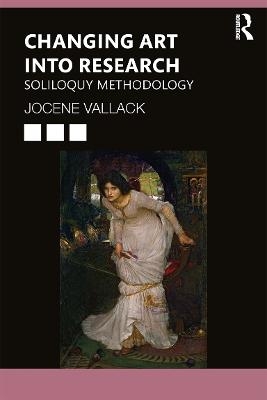
Changing Art into Research
Soliloquy Methodology
Seiten
2020
Routledge (Verlag)
978-1-138-48678-2 (ISBN)
Routledge (Verlag)
978-1-138-48678-2 (ISBN)
This book sets out a new and simple, yet theoretically aligned methodology for arts-based researchers, with an emphasis on phenomenology. It shows how to use arts practice for data analysis and presentation, while remaining aware of the requirements of rigour in research.
Changing Art into Research: Soliloquy Methodology presents a research methodology that enables inquiry into one’s personal experiences in an endeavour to reveal essential commonalities of human experience. Arts-informed research methods are becoming increasingly popular with scholars in Arts, Education and the Social Sciences, but there is often confusion about how to turn arts practice into rigorous inquiry.
This book examines the theoretical perspectives needed to inform these research approaches, which are often missing in methods teaching and research. Soliloquy is a new methodology that interprets and applies Husserl’s philosophical concept of Transcendental Phenomenology. It marries together the synthesizing powers of the unconscious mind with the analytical capacities of conscious cognition and articulation. It further explores the possibility that both cognitive and intuitive ways of knowing are valid and appropriate for academic inquiry, provided these methods are aligned through a philosophically consistent, theoretical framework.
This book will be of great interest to academics and postgraduate students engaged in arts-based qualitative research and those doing an arts-based practice dissertation.
Changing Art into Research: Soliloquy Methodology presents a research methodology that enables inquiry into one’s personal experiences in an endeavour to reveal essential commonalities of human experience. Arts-informed research methods are becoming increasingly popular with scholars in Arts, Education and the Social Sciences, but there is often confusion about how to turn arts practice into rigorous inquiry.
This book examines the theoretical perspectives needed to inform these research approaches, which are often missing in methods teaching and research. Soliloquy is a new methodology that interprets and applies Husserl’s philosophical concept of Transcendental Phenomenology. It marries together the synthesizing powers of the unconscious mind with the analytical capacities of conscious cognition and articulation. It further explores the possibility that both cognitive and intuitive ways of knowing are valid and appropriate for academic inquiry, provided these methods are aligned through a philosophically consistent, theoretical framework.
This book will be of great interest to academics and postgraduate students engaged in arts-based qualitative research and those doing an arts-based practice dissertation.
Jocene Vallack taught research methodologies at Monash University and James Cook University in Australia, and St John’s University in Tanzania. She was an invited editor for the Electronic Journal of Business Research Methods and held a Research Fellowship with CQUni. Jocene originally trained in theatre and lectured in Acting at Ballarat and RMIT Universities.
Acknowledgements; Preface; 1. A Concise Overview of Soliloquy 2. The Co-Existing Realities of the Ephemeral and the Eternal: Aristotle and Plato 3. Intuition 4. The Theoretical Perspective of Soliloquy: Transcendental Phenomenology 5. Soliloquy for the Intuitive Researcher: The Methods; Glossary of Terms
| Erscheinungsdatum | 21.01.2020 |
|---|---|
| Zusatzinfo | 6 Tables, black and white; 1 Line drawings, black and white; 16 Halftones, black and white; 17 Illustrations, black and white |
| Verlagsort | London |
| Sprache | englisch |
| Maße | 156 x 234 mm |
| Gewicht | 380 g |
| Themenwelt | Geisteswissenschaften ► Philosophie ► Philosophie der Neuzeit |
| Sozialwissenschaften ► Soziologie ► Empirische Sozialforschung | |
| ISBN-10 | 1-138-48678-7 / 1138486787 |
| ISBN-13 | 978-1-138-48678-2 / 9781138486782 |
| Zustand | Neuware |
| Haben Sie eine Frage zum Produkt? |
Mehr entdecken
aus dem Bereich
aus dem Bereich


